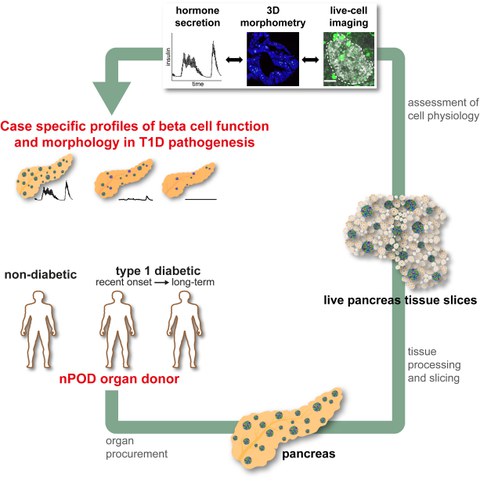Apr 23, 2020
New approach to study human pancreas pathogenesis in the development and progression of T1D

Schematic representation of the use of pancreas tissue slices to obtain organ specific profiles of donor pancreas pathophysiology for increased knowledge about mechanisms of T1D pathogenesis.
In type 1 diabetes (T1D), autoimmune destruction of pancreatic beta cells leads to insulin deficiency and loss of glycemic control. However, knowledge about pathophysiology in T1D remains incomplete, also due to a lack of technologies to study the live human pancreas in T1D. To address this limitation, an international collaboration under the lead of Prof. Stephan Speier from the Paul Langerhans Institute Dresden at the Helmholtz Zentrum München, together with the Network for Pancreatic Organ donors with Diabetes (nPOD), developed a new method that for the first time allows the detailed examination of intact, living pancreatic tissue from organ donors at different stages of T1D pathogenesis. The results of this work have now been published in ‘JCI Insight’.
Type 1 diabetes (T1D) is a chronic autoimmune disease characterized by the selective destruction of insulin-producing beta cells, resulting in massive reduction of beta cell mass, insulin deficiency, and hyperglycemia. Genetic susceptibility and environmental factors are known to contribute towards development and onset of autoimmunity. However, the cellular processes underlying the loss of functional beta cell mass in the pancreas and resulting in the onset of diabetes are not fully understood.
Much of the current knowledge about disease pathogenesis has been derived from studies performed in rodent models. However, although important for our understanding, these animal models do not depict all aspects of human T1D. “Over the last 10-15 years enormous efforts have been made to provide researchers with tissues from organ donors to facilitate the study of T1D pathogenesis in humans”, explains senior author Prof. Stephan Speier, group leader at the Paul Langerhans Institute Dresden (PLID) and Professor of Islet Cell Physiology at TU Dresden. “Unfortunately, the available methodologies did not allow the study of intact viable donor pancreas tissue, thereby limiting the information on disease relevant mechanisms that could be obtained from these organs. To overcome this limitation, we teamed up with the Network for Pancreatic Organ donors with Diabetes (nPOD), which is based at the University of Florida and coordinates the largest procurement of pancreases from organ donors with T1D, as well as from autoantibody positive and negative organ donors without diabetes”.
“Together with our collaborators from the University of Florida Diabetes Institute, the Diabetes Research Institute Miami and the University of Miami, we advanced and translated a previously by our group developed platform to establish the preparation of pancreas tissue slices from donor pancreas procured by nPOD. In our study, we show that viable tissue slices can be readily prepared from nondiabetic (ND) and T1D donor pancreases. The obtained slices enabled us to study for the first time the physiology of endocrine, exocrine and immune tissue compartments and their interactions in their natural tissue environment during the development and progression of T1D. Through the simultaneous investigation of tissue morphology and cell physiology, and its correlation with clinical data, we were able to develop case specific profiles of pancreas pathophysiology in T1D diabetes”
“We have now made this platform available to a larger group of investigators and nPOD is now providing pancreas tissue slices from the procured organs to laboratories with complementary technologies and expertise. In a coordinated and unprecedented approach these researchers now address important open questions of T1D pathogenesis in donor organs at different stages of the disease. We are optimistic that the use of this newly established platform of pancreas tissue slices from organ donors, will facilitate the generation of new information about the mechanisms underlying T1D development and disease heterogeneity, to support the design of successful T1D therapies”, concludes Prof. Speier.
Further Information
Panzer JK, Hiller H, Cohrs CM, Almaca J, Enos SJ, Beery M, Cechin S, Drotar DM, Weitz JR, Santini J, Huber MK, Qadir MMF, Pastori RL, Domínguez-Bendala J, Phelps EA, Atkinson MA, Pugliese A, Caicedo A, Kusmartseva I and Speier S. Pancreas tissue slices from organ donors enable in situ analysis of type 1 diabetes pathogenesis. https://doi.org/10.1172/jci.insight.134525.
